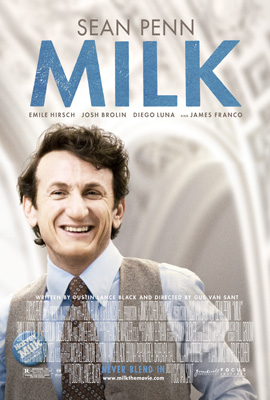History contains certain stories about people, issues and movements that should be told, regardless of controversy. One such story is the compelling story of the first gay man elected to high political office, Harvey Milk. After many years and attempts at making a feature film on this story, Gus Van Sant, one of the greatest living artistic and cinematic masters, brings Milk’s story to the screen, in “Milk.”
“Milk” is a quality film not just as a work of art, but it is a historical film that parallels the struggle for and against gay rights. The film is extremely relevant with both our past and present political situation in California and the United States as a whole.
The film starts with a flash-forward to 1978, with Milk (Sean Penn) recording his will on cassette tape and telling his story. The film then flashes back eight years to his 40th birthday when he meets Scott Smith (James Franco). They spend the night together and run off to San Francisco after quitting their jobs.
After witnessing the beatings and harassment of fellow gay San Franciscans, Milk makes a decision to run for office. After years of losing, Milk adds some new blood to his campaign, Cleve Jones (Emile Hirsch) and Anne Kronenberg (Alison Pill), and finally becomes not only the first gay man elected to the San Francisco board of supervisors, but also the first gay man elected to high political office in the U.S. Milk faces tough challenges, including a proposition to ban gay men from teaching in public schools. The campaign is led by conservative politician John Briggs, conservative Christian Anita Bryant and a direct and dire opposition in the city council, Dan White (Josh Brolin).
The performances are the strongest part of this film. Penn once again shows why he is one of America’s greatest living actors with this Oscar-worthy performance. He provides the perfect mixture of subtlety and inspiration as Milk. Equally, Hirsch proves his worth as being a funny and boisterous Jones. Brolin genuinely portrays White, gracefully playing him as a somewhat tragic character and, like Penn, becomes the character in every aspect, from body language to appearance and speech. Pill is also good as Kronenberg. She plays the passionate character with gusto and is a great supporting addition to the cast.
Although this film contains strong individual performances, it falls short in other areas. While screenwriter Dustin Lance Black’s script is adequate, the story could have gone deeper into Milk as a man, not just a symbol. Black does give much about Milk’s personal life, but the political movement takes center stage in the film. Also, Van Sant collaborator and cinematographer Harris Savides once again shows that he can capture the vast differentiation in color and tone of the 1970s in this film, just as he did in “Zodiac,” David Fincher’s crime drama last year. But Van Sant does little with these visuals. Rather than being more artistic or using the visuals to drive the story, he relies on the exposition and dialogue in Black’s script.
Some may be apprehensive to see a film that deals with such a controversial issue like gay rights. But “Milk” is an important film that is relevant in light of the political battle over Proposition 8 in the November elections. Whether you approve of the characters’ behavior or what they stand for, they are still people who are a part of our country’s past. We can learn from this story and pause for reflection and, at the very least, watch the film to understand the other side. Although it is not as good as some of Van Sant’s other work, and perhaps not as deep as it could be, “Milk” is a solid mainstream biopic and a film to view and discuss.







